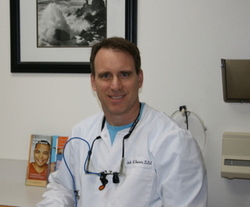A partial denture is a removable dental appliance that fills in the space created by missing teeth and fills out your smile. It is made for people who still retain some teeth. A partial denture can help you to properly chew food; a difficult task when you are missing teeth. In addition, a partial may improve speech and prevent a sagging face by providing support for lips and cheeks.
A partial denture is made primarily of hard acrylic connected to a metal framework. The bulk of the appliance just rests on the gums and attaches to your natural teeth with metal clasps or devices called precision attachments. It is important for the remaining natural teeth to be properly restored and shaped before making the partial denture. This allows for the best fit and longevity of the appliance. A healthy mouth will insure that your treatment progresses with the greatest possibility for success.
Several appointments are usually needed to complete the treatment. Once the gums are healthy and the teeth have been optimally restored, impressions are made of your teeth and gums. Often times this requires two appointments in order to capture the fine details of your mouth in the most accurate way with custom made impression trays. The metal framework is then made to fit the models and is tried in the mouth for accuracy. Once the metal framework is fitting properly, the denture teeth can be set to place. Usually, this is tried in the mouth for approval before processing and finishing the partial in the hard acrylic. The finished partial denture will need to have minor adjustments by the dentist in order for it to feel good and fit comfortably in the mouth. Usually, one or more appointments will need to be made for further adjustments as you start wearing it.
Partial dentures are only substitutes, at best, for your natural teeth. Generally, a substitute is not as good as the original. It may take six to eight weeks for your mouth to adjust to the new denture. It takes a great deal of practice and patience on your part before you will master the use of the new partial. A feeling of fullness, additional saliva, difficulties with speech, eating, and soreness are inevitable when you first wear new dentures. Time, experience in their use, and help from your dentist will aid you in overcoming these problems. Since the mouth tissues, ridges, bone, etc. are constantly changing, it will be necessary to refit or remake the partial denture occasionally, sometimes every few years.
Good oral hygiene and regular dental office visits for professional cleanings and exams are necessary to help prevent problems from developing. With a partial in place, it is easier to develop cavities around the remaining teeth. Partial dentures should be removed after meals to clean food debris from the partials and the mouth. They need to be cleaned daily.
Partial dentures do move. If you prefer something more fixed in your mouth that doesn’t move, then you need to consider dental implants or a fixed bridge if possible.

